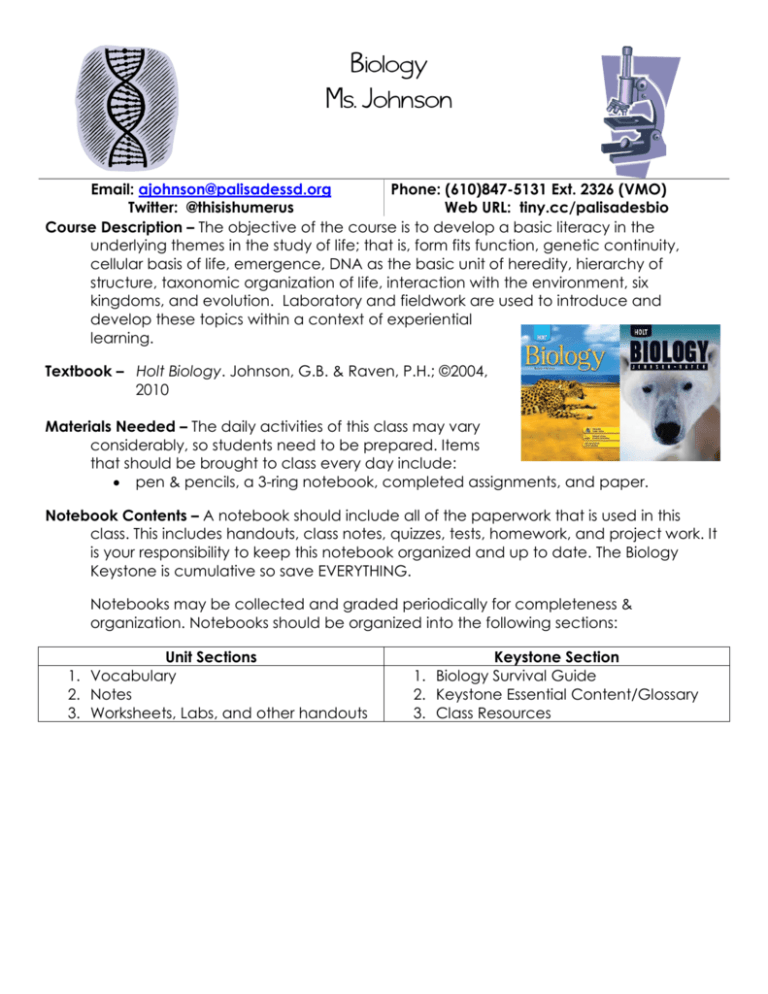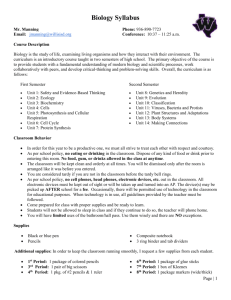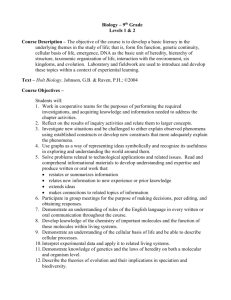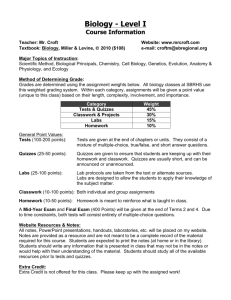Biology – 9th Grade
advertisement

Biology Ms. Johnson Email: ajohnson@palisadessd.org Phone: (610)847-5131 Ext. 2326 (VMO) Twitter: @thisishumerus Web URL: tiny.cc/palisadesbio Course Description – The objective of the course is to develop a basic literacy in the underlying themes in the study of life; that is, form fits function, genetic continuity, cellular basis of life, emergence, DNA as the basic unit of heredity, hierarchy of structure, taxonomic organization of life, interaction with the environment, six kingdoms, and evolution. Laboratory and fieldwork are used to introduce and develop these topics within a context of experiential learning. Textbook – Holt Biology. Johnson, G.B. & Raven, P.H.; ©2004, 2010 Materials Needed – The daily activities of this class may vary considerably, so students need to be prepared. Items that should be brought to class every day include: pen & pencils, a 3-ring notebook, completed assignments, and paper. Notebook Contents – A notebook should include all of the paperwork that is used in this class. This includes handouts, class notes, quizzes, tests, homework, and project work. It is your responsibility to keep this notebook organized and up to date. The Biology Keystone is cumulative so save EVERYTHING. Notebooks may be collected and graded periodically for completeness & organization. Notebooks should be organized into the following sections: Unit Sections 1. Vocabulary 2. Notes 3. Worksheets, Labs, and other handouts Keystone Section 1. Biology Survival Guide 2. Keystone Essential Content/Glossary 3. Class Resources Assignments – Assignments usually fall in to one of the following categories: homework, labs, quizzes, tests, projects. All assignments are to be completed to the best of your ability. As long as there is evidence that you attempted a question you may receive credit. Homework: Specific assignments are given every day and checked the following class. Reading assignments in the text or otherwise will be frequent and will be checked through note checks and / or quizzes. It is the general expectation that even if no specific assignment is given, students will spend time reviewing notes and other material covered in class. Labs: Throughout the course, activities and labs will be conducted in order to strengthen understanding and develop inquiry skills. Labs may be directed with specific instructions or open-ended allowing students to develop their own procedures. Both formal and informal write-ups may be required at the conclusion of the lab. Quizzes: Quizzes will be used frequently to assess progress. These short assessments may be announced or unannounced. Often, quizzes will be used at the beginning of a class to check homework or at the end of a lesson to check understanding. Tests: Tests will always be announced a week in advance and usually occur at the end of a unit. Formats of tests vary depending on the material. See the quiz/test policy below for retake policies. Retaking tests are not meant to be a do-over, but as a way to improve your understanding of material. Grades may or may not be improved by retaking tests. Projects: Many units will include various larger projects that are designed to deepen understanding of the content, as well as developing applied skills. Plagiarism & Cheating – It is expected that students and instructors will act responsibly and honestly in all aspects of the course. • Plagiarism/Cheating is the stealing or claiming of someone else‘s ideas or words as your own without crediting the source and/or aiding in this act. This includes submitting the same homework, projects, etc… as another student or sharing your work with another student unless group work is specified in writing by the instructor. • Students are responsible for keeping their account information private and ensuring that all work submitted is their own. The following penalties will be assessed if a student is found guilty of defying the academic integrity policies: 1. You will be given a zero as a final grade on that assignment. 2. Parental notification by the teacher will occur. 3. First offense will result in a one day in school suspension. (ISS) 4. Second offense will constitute out of school suspension. (OSS) 5. You will be denied privilege of membership in academic clubs for the remainder of the year. Any future recommendations given by teachers may also be affected. Grading – Grades will correspond to the school’s grading system: Each marking period consists of 40% of the total grade with the final being worth 20%. Interim grade reports will be distributed periodically throughout the semester. Your grades can be checked online using the district website (Power Schools) Work is expected to be handed in on time and complete Late work will be deducted 10% per day, after 1 week it can be submitted for 50%, after 2 weeks it will not be accepted Points will also be deducted for incomplete work Online Gradebook – Palisades utilizes Pearson’s PowerSchools online grading and attendance program. The following will help in deciphering the various codes used in the program: If there is a blank for the assignment, I have collected the assignment but have not yet entered the grades into PowerSchools. This should NOT be interpreted as receiving a zero on the assignment, I strive to have assignments in PowerSchools within 7 days of their submission. Papers and projects may take longer to enter. This is not hurting your grade. If you were absent on the due date, it must be submitted the day you return to school for full credit. "M" means missing. I have collected the assignment and did not receive one from you or one with your name on it. This will adversely affect your grade! Please turn in assignments ON TIME! If there is an "L" next to the assignment, it was submitted late. All assignments will have 10% deducted for each day it is late. If it is something we went over in class, was collected and graded, or is submitted after 2 weeks, I will not accept the assignment and it will be marked as a zero. "EX" means a student is excused from the assignment, it is not calculated in your grade. On grade reports this can also be an asterisk(*) next to the assignment name. "0" means you submitted the work and it was blank, wrong, or plagiarized. It is also possible this means the work can no longer be submitted for any points. This assignment is being used to calculate your grade so it will hurt your grade. How much it affects your grade depends on the point value, smaller assignments have less of an impact than larger assignments. PLEASE NOTE: When you submit late work it may not appear on PowerSchool for some time. Late work is very low on my list of priorities; strive to complete your work and hand it in on time! This becomes an issue with sports eligibility; if it is late, it goes to the bottom of my grading pile. Be aware of your grades at the end of each week! That way there are no surprises when eligibility comes out Monday morning; I do not give athlete's assignments the priority, especially if they are late. Test and Quiz Policy –If a student scores below 70% on a test, they are eligible for a “second chance”. A “second chance” test must be taken before or after school within a week of receiving the original test grade, Arrangements need to be made between the teacher and student the day prior to the make-up. You may only use your “second chance” once per marking period! A “second change” is not retaking the same test over again. The grade for the test will be the average of the original and make-up grades; to be fair to other students who did well on the test, the average of your original and make-up grade cannot exceed 70% (C-). Attendance and Missed Work – Students are responsible for making up any missed work. All missed work should be completed and turned-in in a timely manner upon the students return. In some cases time will need to be scheduled after school to make up a labs or other class work. If students know they will miss class in advance, they should ask the instructor for work before the absence. Each class has an absent folder located at the front of the room. I will not chase you down if you missed class and important information. Ask three before me! Contact Information & Extra Help– The best method of contacting me is via e-mail at ajohnson@palisadessd.org. I am not available after 3pm from September 1 through October 31 or March 1 through May 15 due to my coaching obligations. I am available most days after school between November 1 and February 28, as well as at the end of the school year but please check in advance to be sure. Other important information can also be found on my website and Google Classroom. If you need to stay longer for help or to work on a project please let me know in advance so I can make arrangements! Class Rules & Expectations – All school policies apply. We will develop our own class rules together and adjust them as needed. Generally speaking, everyone should respect each other, respect the physical environment, and respect the learning process. Cell Phone Policy – Cell phones can be a powerful educational tool, however, there are appropriate times and places for their use. Cell phones must be SILENCED and put away during class unless otherwise directed by the teacher. If students have proven themselves trustworthy, they may be permitted to listen to music while doing CLASSWORK. Cell phones may be used during labs as timers or recording devices, during class for quick checks or quizzes, or other educational means. If you are caught with your cell phone out without permission, it will be confiscated for the rest of the period. Repeat offenses will result in disciplinary action according to the student handbook. Portfolio Development – Students may wish to document their improvement in science by including certain activities in their portfolio. These activities include lab reports, diagrams and models, group projects, and scientific writing. Safety Considerations – Science classrooms can be dangerous and it is vital that students listen to and follow all safety instructions. Students not paying attention to directions put themselves and their classmates at risk. This will not be tolerated; if you are putting yourself or a classmate in danger, you will be immediately removed from class and sent to the office. Computer Policy - There will be many times during the semester where we will be using the school’s computers, tablets, or chromebooks. These times are to be used for doing work only. Game playing, instant messaging, emailing, and viewing inappropriate sites are not permitted. Failure to comply will result in the loss of computer privileges and possible disciplinary action according to the student handbook. Outline of Course Content – Beginning with the 2012-2013 school year, the Biology Keystone will be given in place of the 11th grade Science PSSA. All students completing biology, beginning with the class of 2017, will be required to score proficient on the Biology Keystone in order to graduate. Please visit my Palisades website for more information on the exam. Basic Biological Principles o Explain the characteristics common to all organisms (A.1.1) o Describe relationships between structure and function at biological levels of organization (A.1.2) The Chemical Basis for Life o Describe how the unique properties of water support life on Earth (A.2.1) o Describe and interpret relationships between structure and function at various levels of biochemical organization (A.2.2) o Explain how enzymes regulate biochemical reactions within a cell (A.2.3) Bioenergetics o Identify and describe the cell structures involved in processing energy (A.3.1) o Identify and describe how organisms obtain and transform energy for their life processes (A.3.2) Homeostasis and Transport o Identify and describe the cell structures involved in transport of materials into, out of, and throughout the cell (A.4.1) o Explain mechanisms that permit organisms to maintain biological balance between their internal and external environments (A.4.2) Cell Growth and Reproduction o Describe the three stages of the cell cycle: interphase, nuclear division, cytokinesis (B.1.1) o Explain how genetic information is inherited (B.1.2) Genetics o Compare Mendelian and non-Mendelian patterns of inheritance (B.2.1) o Explain the process of protein synthesis (i.e., transcription, translation, and protein modification) (B.2.2) o Explain how genetic information is expressed (B.2.3) o Apply scientific thinking, processes, tools, technologies in the study of genetics (B.2.4) Theory of Evolution o Explain the mechanisms of evolution (B.3.1) o Analyze the sources of evidence for biological evolution (B.3.2) o Apply scientific thinking, processes, tools, and technologies in the study of the theory of evolution (B.3.3) Ecology o Describe the ecological levels of organization in the biosphere (B.4.1) o Describe interactions and relationships in an ecosystem (B.4.2) Please note: the amount of time spent on the course content may vary to fit the needs of a particular group of students.








